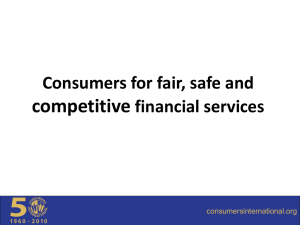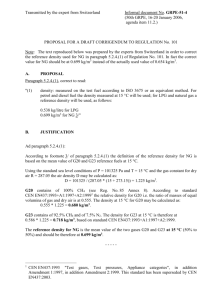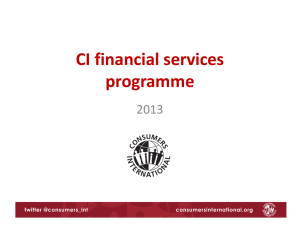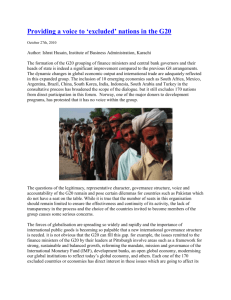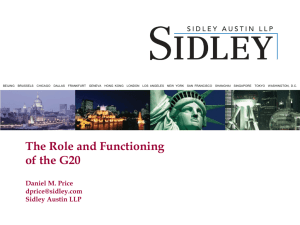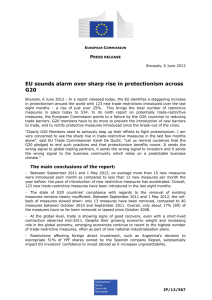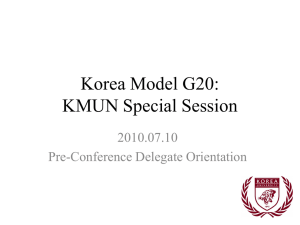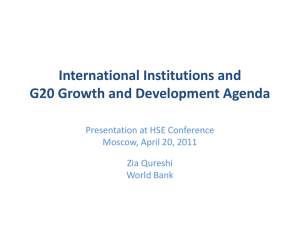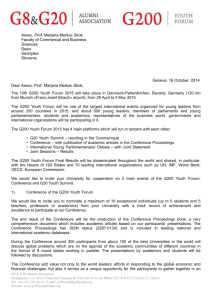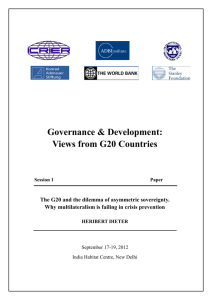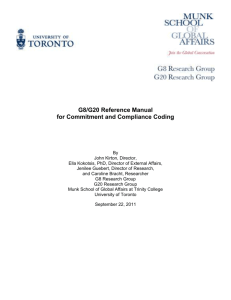DOC - Europa
advertisement
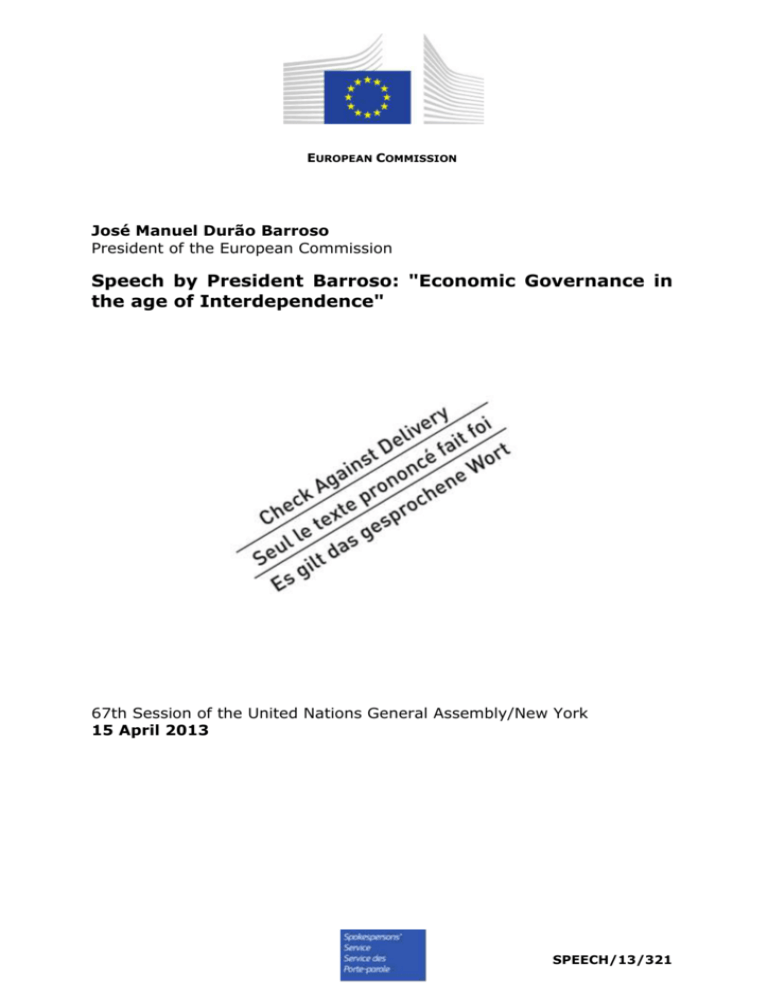
EUROPEAN COMMISSION José Manuel Durão Barroso President of the European Commission Speech by President Barroso: "Economic Governance in the age of Interdependence" 67th Session of the United Nations General Assembly/New York 15 April 2013 SPEECH/13/321 Mr President of the General Assembly, Deputy Secretary-General, Prime Minister, Excellencies, Distinguished guests, Ladies and gentlemen, One of the purposes of this great institution as set out in Article 1 of the UN Charter is: "To achieve international co-operation in solving international problems of an economic, social, cultural, or humanitarian character," These last years have proven that this is more valid than ever. Today no nation or group of nations can prosper on the wreckage of another. In a globalised, interconnected world we are all neighbours and no country is big enough to be immune to what happens next door. Greater co-operation and co-ordination between nations is no longer just the responsible choice. Today it is essential for managing our shared global challenges and optimising the opportunities that interdependence offers. And the United Nations has an ever more crucial role to play in this. This is why I congratulate the President of the General Assembly for this initiative and the Secretary General for lending its support to it. President, The European Union is no stranger to interdependence: our Member States' economies are the closest linked in the world with the world's largest Single integrated market. So we have had to face the vital question of how best a group of States can work together and by pooling sovereignty better address current challenges and be effective in our policy responses. We have learnt through experience – good and bad - as we have sought to turn the challenge of interdependence into the reality of common governance. I would like to share some of what we have learned here today. The genius of European integration was precisely to replace step by step, by concrete achievements and progress, the logic of international power politics by a law-based order; to turn the strict national independence into a European interdependence. This dynamic was present at every phase of the European integration process: from the Coal and Steel Community to the European Economic Community; from the Single Market to the Economic and Monetary Union; from the Banking Union that we are now developing to the further integration efforts in the years to come. Time and again practical cooperation has led to political integration; shared problems have led to shared solutions; small steps for Member States have been giant leaps for Europe as a whole. This is also the logic that has presided over our response to the financial and economic crisis. A differentiated action that takes into account 27 Member States, very soon 28 Member States, each with their own specificities, but also the fact that all of them are united by a single market, common institutions and for 17 of them a common currency, the Euro. In an interdependent economic system there are inevitably spill-overs that need to be addressed through greater co-ordination of policies. For this reason we have had to reinforce the system of economic governance in the European Union. 2 We have introduced tighter surveillance systems for budgetary and economic policies. The new rules ensure that there is better monitoring and coordination of national policies throughout the year, along with swifter sanctions if needed. This new system helps Member States deliver on their budgetary and reform commitments while making the Economic and Monetary Union as a whole more robust. Second, we are undertaking a profound reform of the financial sector. A system based on domestic supervision and domestic regulation is not enough when your market is European or even global. So our work to strengthen the system continues. We have agreed laws to implement Basel 3 and ensure that the 8000 banks in the EU are more resilient banks. We are putting in place a single rule book for the financial sector and have created new European supervisory authorities. We are working towards a true banking union in the Euro Area and beyond, with a single supervisor and soon a single resolution mechanism. Thirdly, part of the answer to the problems is not retrenchment but engagement. This is also what we are doing in the EU. Open economies and a free and unimpeded international trade is crucial for the global recovery. Trade is indeed a vital external driver of growth. The European Union has been a supporter of free trade and of the multilateral system and we are seeking to deepen our trade and economic relationships with many countries and regions across the world. But let me be very clear on one point, our bilateral trade agenda does not affect or replace our commitment to the WTO and to the Doha development Agenda. On the contrary, it is a complement to it. We will continue to try and move forward where possible at the WTO, for instance on trade facilitation which would have a huge positive impact for developing countries, and also make sure our FTAs prepare the ground for the next level of multilateral liberalisation and rulemaking. Ladies and gentlemen, Each of these points is of particular importance for Europe, but the problems we are seeking to address are ones that many global partners also share. Each has an impact on the broader global economy and the efficacy of each measure is itself determined in part by global developments. Let me turn to the EU's interaction with the G20 to illustrate this point and demonstrate the added value which broader international co-ordination may bring. The global financial crisis was a watershed in global economic governance. The European Union was one of the first key actors to recognise that the financial crisis required a globally coordinated response and proposed to have meetings of the G20 at the levels of Leaders. A new forum was needed to bring together advanced economies and emerging markets. The importance of the G20 in the response to the global financial and economic crisis of 2008 is clear. The G20 has proven a very effective forum for coordinating a global response and thus avoid the mistakes that were made in the economic crisis in the 1930's. 3 Let us remember some of the key points of this G20 crisis response: It allowed, in a first phase, for coordination of the concerted fiscal stimulus programmes; It committed to ensure "that all financial markets, products and participants are regulated". Real progress has been made on financial regulatory reform, for example through Basel 3, but further work is needed, for example, to address nonbank actors (shadow banking); It agreed to increase global financial firewalls by trebling the IMF's resources; It agreed on the important commitment to refrain from trade protectionism and the temptation to retreat inwards; After the extraordinary stimulus of 2008 the G20 has addressed the high levels of public debt, so as to put the global economy on a firmer, sustainable footing for the future. The G20 decided to reform global economic governance by agreeing on a shift of power in the IMF and the World Bank to better reflect global economic realities. And let me say in all these matters the European Union, and I was participating in all those summits, was very active accepting precisely the idea of the G20 working with the global community. Last but not least, the G20 has placed development high on its agenda. In fact, the fight against poverty and against unequal distribution of wealth could not be out of an international forum that has an objective to restore strong, sustainable, balanced growth. The EU has actively shaped this G20 agenda. And it is delivering on all of these items. Our own experiences with strengthening economic governance, reforming financial services, promoting development helped us to build consensus for improving the situation at the global level. We believe that the G20 has achieved a lot, but also that more needs to be done on many fronts. The G20 will be judged by how its members stick to agreed commitments. Past commitments need to be respected, unfulfilled commitments need to be addressed, and new commitments on new challenges need to be agreed. The EU will do its part to move the G20 agenda forward including its outreach with developing countries and stronger interaction with the UN. Indeed, on these and other matters we are already working very constructively with the current Russian G20 Presidency. President, Ladies and gentlemen, One principle which has underpinned the EU action at a global level, and to which I attach great importance to, is fairness. As I said earlier, it is not acceptable that one nation or group of nations prospers to the detriment of others. The same goes within our societies. The European Union is working to ensure greater fairness within the European economy but also globally. Let's take one example: tax evasion. It costs the EU €1 trillion every year. The global bill is much higher. That is money that should be available to spend on education, skills, healthcare, and infrastructure investment in both developed and developing countries. Within the EU we are taking common action on exchange of information, on tax havens and on aggressive tax planning. But as we know, tax avoiders are adept at taking advantage of gaps and loopholes in the different tax regimes around the world. So we are convinced that there is a need for a global approach to improve tax governance 4 everywhere. Tax havens are indeed heavens for tax evaders and fraudsters, but they are hell for the law abiding citizen and responsible tax-payer. The EU is very supportive of the OECD work (backed by the G20) and we will be working on developing synergies with the European Union's own initiatives on tax fraud. Work should focus on the compatibility of standards for automatic exchange of information on a global basis, taking into account the particular features and legal requirements of all countries involved. The EU would strongly support a joint effort towards a new multilateral standard in the context of the OECD. Ladies and gentlemen, There is now a new momentum concerning the need to fight tax evasion and tax fraud. It is important that at global level, from the G20 to the UN, there is a unity of purpose for tax justice and fairness. Fairness is also the driver behind work to combat corruption. The EU has been a strong advocate of greater transparency in payments made to host governments by extractive and similar industries. As an additional step our member States last week agreed on the Transparency Directive that will hold governments and companies involved in extraction and forestry more to account. Ladies and gentlemen, Let me end my intervention with some basic principles, the same principles which underpin the functioning of the European Union and the Union's relations with the world. The first is subsidiarity; the idea that a task should be carried out at the level where it can most effectively be realised. Inside the EU if a task can best be completed locally or nationally it should be carried out at that level. However, there is the understanding that in an interdependent Europe even if implementation is best carried out at one level there may be need for better co-ordination and concerted policy making at a higher level. We believe this also applies to a large extent to the global community. Second, where competences are set, they should be respected. Within Europe we have clear treaty based division of competences; globally we have organisations such as the UN or WTO with a very clear mandate. We respect these and will continue to do so. Thirdly, we need to have fairness as a guiding principle in our policy choices. Even in times of crisis the EU does not forget its responsibilities towards those most in need and remains the world's largest donor of development assistance with more than half of the global share. We need to give an additional impetus on the implementation of the MDGs and prepare post 2015 framework that links eradication of poverty with sustainability considerations. Development without sustainability is just an inflated bubble that can bust at any time. Finally and most importantly, we need multilateral structures that can manage our interdependence and today's multi-polarity. It is essential that our citizens feel they are part of this debate. This includes opening the public debate not only in our respective societies, but also at the global level. This is what we are doing here precisely today. Today's discussion is one element in this and for this reason also it has been a privilege to speak here today in this house where the entire international community is represented. I thank you for your attention. 5
